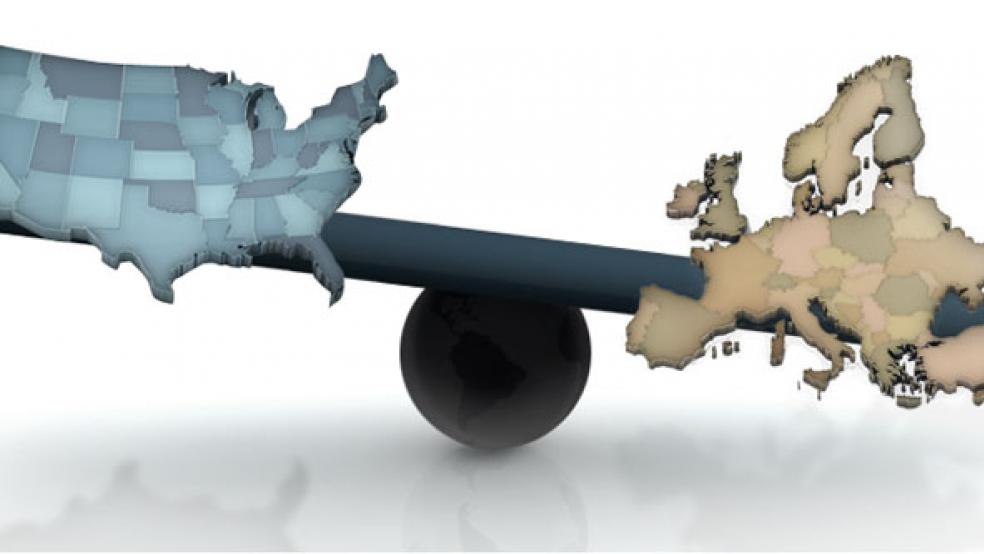It’s the taper, stupid.
Next week’s scheduled meeting of Federal Reserve policymakers is being put forward as the reason for some market swings in recent days. The S&P 500 and other U.S. stock benchmarks traded lower Wednesday amidst anxiety that the just-agreed budget deal in Washington increases the likelihood that the Fed will act sooner to begin pulling back its long-standing $85 billion monthly bond buying program.
The big win on the budget front – no more worries, at least for the time being, of a government shutdown or major paralysis on key funding issues – removes one source of uncertainty but heightens another: fear of the Fed. Does the deal really make a taper this month more likely? If it does, is the economy ready to stand on its own two feet?
The answers to those questions have consequences in financial markets beyond the borders of the United States. That’s because the decision to taper will remove a major source of buying in the bond market, likely resulting in long-term interest rates drifting higher. That has ramifications for the dollar, too, which is likely to climb as higher rates make holding dollar-denominated bonds more attractive.
Given the degree to which global financial markets are linked, that will have an impact on markets in other regions, especially those still committed to keeping monetary policy “loose” and interest rates low. Every sign that pundits interpret as increasing the likelihood of the “taper” has been met with a decline in European stocks, for instance.
Related: 5 Money-Saving Tax Moves to Make Right Now
This kind of lockstep move leaves investors eager to diversify out of U.S. stocks, especially in the wake of this year’s astonishing gains, facing a bit of a conundrum. Logic, history and the fundamental rules of investing suggest that selling what has gone up and buying what has gone down can help boost long-term outperformance, especially since European markets are trading at a discount to those in the United States. But making the decision to pull money out of one market that is doing extraordinarily well to invest it in another that hasn’t kept pace is tough, psychologically.
It’s made tougher by the fact that Europe faces some headwinds that aren’t likely to abate very much in 2014. The region’s economic recovery is still struggling: Eurozone GDP grew a measly 0.1 percent in the third quarter, as the region battles to recover from its 18-month recession. Unemployment remains sky-high in countries like Spain and economists argue it will take years for some parts of the region to recover. Meanwhile, policymakers are still battling over how to national sovereignty and the need for sensible banking policy.
In spite of all those worries, European stocks have done well this year, with the Dow Jones Euro Stoxx 50 up nearly 12 percent and Germany’s DAX heading into the final weeks of 2013 with a gain of almost 20 percent. Comments like those made recently by ECB President Mario Draghi that growth seems likely to be better than previously estimated could well fuel further buying interest.
A recent report by co-chief investment officers of Deutsche Bank’s wealth management division suggests some reasons why that might be true. Asoka Woerhmann and Randy Brown concede that economic growth in the United States is likely to outstrip that in Europe, but while they expect the S&P 500 to climb another 6 percent between now and the end of 2014, they predict that major Eurozone indexes – the Stoxx 600, the Euro Stoxx 50 and the DAX – will see gains of 10 percent to 11 percent, on the back of earnings growth of 14 percent to 15 percent.
“Europe and the emerging markets have the greatest potential to surprise … not least because many investors have been giving them a wide berth,” Woerhmann and Brown write. They expect investors to return to Europe more readily than to the historically volatile emerging markets, and to the extent that any investor who has remained underweight European stocks does boost his holdings, that’s going to show up quickly in higher market valuations.
Still, being picky may well pay off for investors thinking of venturing back to Europe. Export-oriented companies might well be a savvy choice, given that the ECB has clearly signaled its intent to keep interest rates lower. That means that as the dollar rises against the Euro, European goods may become cheaper in major export markets.
One sector that’s particularly interesting is the financials group, which the Deutsche Bank team suggest will see “a significant boost in earnings.” Indeed, analysts at Thomson Reuters I/B/E/S already note that this is one of a handful of sectors expecting to see earnings growth next year, along with information technology companies. So far, at least, the corporate earnings drought seems to persist across the Eurozone, they note.
It may also be wise to pay attention to which country you are investing in: Greek corporate profits are soaring, as are those of companies based in many parts of Scandinavia, according to third-quarter data from Thomson Reuters I/B/E/S, but Italian companies are on track to report that third-quarter profits were cut in half.
Another fact to remember is that when you invest overseas, you’re taking on foreign currency risk. That’s particularly important right now, at a time when the dollar is likely to outperform, meaning that by the time you translate local currency gains into greenbacks, they’ll have shrunk. If that kind of extra risk is too much for you to swallow, WisdomTree offers a range of exchange-traded funds (ETFs) that strip out that currency risk.
It’s easy to find reasons not to diversify your portfolio, especially at periods of uncertainty with respect to economic growth and central bank policy decisions. But anxiety and fear are never good reasons not to at least ponder this kind of strategic decision.
Top Reads from The Fiscal Times:






